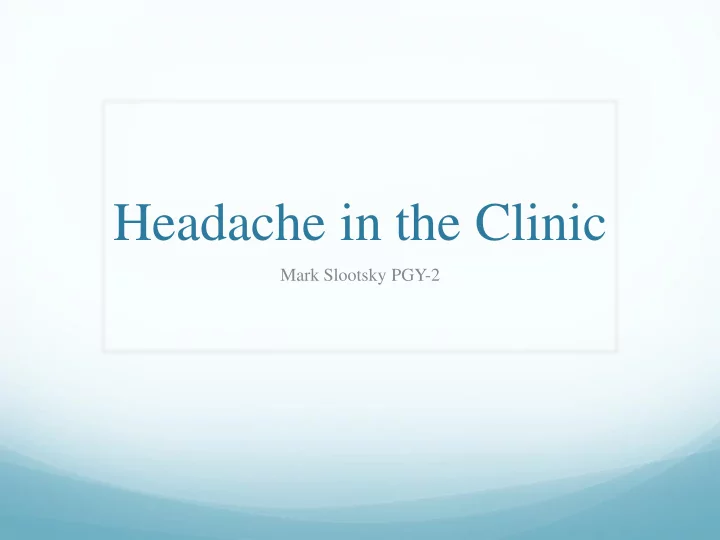

Headache in the Clinic Mark Slootsky PGY-2
Background 50% adult population world wide is affected by HA disorder 1 Primary vs Secondary HA Most common HA types: tension, migraine, and cluster 40, 10, 1 % of adult population respectively Most HA diagnoses are based on patient history
Tension Headache Most common form and affects > 40 % adult pop Symptoms/Presentation: bilateral mild to moderate pressure without associated symptoms Nociceptors in pericranial myofascial tissues are likely source of these HA’s Various forms of tension HA
Tension HA cont’d
Tension HA cont’d
Tension HA Treatment Various modalities: hot/cold packs, US/electrical stimulation, trigger pt injections, occipital nerve blocks, stretching/relaxation techniques Acupuncture: review of 11 studies w/2317 patients showed evidence to support this treatment Medications: NSAIDS, Barbiturates, Analgesics, Ergot alkaloids
Medications Barbiturates Fiorinal (Butalbital, Aspirin, Caffeine) Fioricet (Acetaminophen, caffeine, Butalbital) Abortive medications: Phenergan, Compazine, and Reglan Ergotamine tartrate (alpha adrenergic and serotonin antagonist causing constriction to peripheral and cranial blood vessels
Migraine HA
Migraine HA
Abortive Therapy
Prophylactic Therapy Consider when: Frequency of migraines > 2x/month Duration of attack > 24 hrs Episodes cause major life disruptions, disability > 3 days Abortive therapy fails, overused Abortive therapy used > 2x/week
Prophylactic Medications
Evidence Based Practice for Chronic Daily HA Chronic daily HA defined as HA for 15 + days/month for at least 3 months
Cluster Headache/TAC
Abortive Therapies O2 5-Hydroxytryptamine (5-HT1) rec antagonists (tryptans or ergot alkaloids w/metoclopramide) Dihydroergotamine (IV vs IM)
Prophylactic Therapies CCB (Verapamil) combined w/Ergotamine, Lithium Lithium has been suggested 2/2 cyclical nature of CH, similar to Bipolar d/o Some small controlled trials have found that anticonvulsants (Topiramate, Divalproex) are effective Steroids can terminate cycle and prevent recurrence (high dose for few days taper Nerve Blocks, deep brains stimulation, ablative procedures
Additional Recommendations
Secondary HA
References 1. Hainer BL, Matheson EM. Approach to Acute Headache in Adults. American Academy of Family Physicians 2013; 87 (10). 2. 2. Yancey JR, Sheridan, R, Koren KG. Chronic Daily Headache: Diagnosis and Management. American Academy of Family Physicians 2014; 89 (8). 3. Medscape Website
Recommend
More recommend